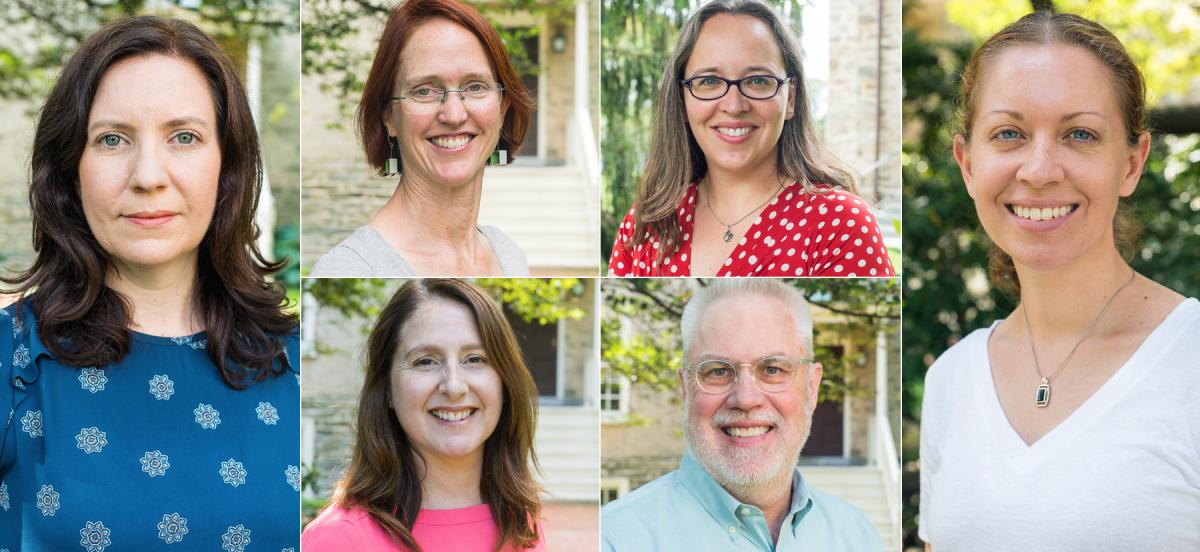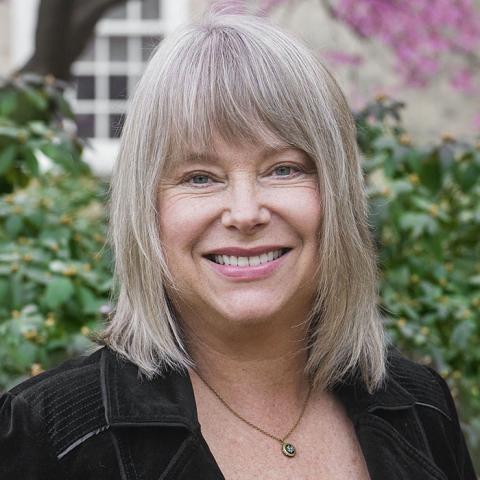Haverford Welcomes Six New Faculty Members

Clockwise from left: Anna West, Andrea Lommen, Karen Masters, Jane Chandlee, David Harrington Watt, and Ariana Huberman. Photos by Patrick Montero.
Details
This year, new professors joined the Departments of Linguistics, Spanish, Physics and Astronomy, and Independent College Programs, as well as the Health Studies Programs.
Joining the faculty as an assistant professor of computational linguistics is Jane Chandlee, who first came to Haverford in fall 2015 as a visiting professor in the Computer Science Department. Chandlee has taught both introductory computer science courses and discrete mathematics, and developed electives in speech technology and computational linguistics. She also served as a senior thesis adviser to both computer science and linguistics majors. Going forward, Chandlee will be teaching linguistics courses that will be cross-listed in computer science, and will serve as an important liaison to both departments, supporting and fostering the growing interest among Haverford students in the interdisciplinary area of computational linguistics.
Chandlee received her undergraduate degree from the University of Delaware, double majoring in English and computer science, and went on to earn an M.F.A. in creative writing from Pennsylvania State University and an M.A. in applied linguistics from Boston University. She then returned to the University of Delaware for her Ph.D. in linguistics. Her research is focused on understanding the computational nature of human language phonological systems.
Ariana Huberman, who was previously a visiting professor at Haverford, was named associate professor of Spanish and chair of the department. Huberman teaches Spanish-language classes, as well as courses on Spanish American colonial writings and Latin American Jewish literature. She received her B.A. from Tufts University and her Ph.D. from New York University. Her research interests include cultural translation, immigration and diaspora, identity and nation, travel narrative in Latin American literature, and Latin American Jewish literature and culture. She is the author of Gauchos and Foreigners: Glossing Culture and Identity in the Argentine Countryside, published by Lexington Books in 2011.
Andrea Lommen joined the Departments of Physics and Astronomy as a full professor, charged with helping to lead and build the program. Before coming to Haverford, Lommen was a professor of physics and astronomy at Franklin & Marshall College, where she was the chair of the department as well as the director of F&M’s Grundy Observatory. She also was selected to be part of a NASA mission, the Neutron Star Interior Composition Explorer (NICER), which launched to the Space Station in June. NICER is an X-ray telescope that will detect X-rays from pulsars, providing a wealth of data for astronomers worldwide to analyze.
A sought-after speaker, Lommen, who brings a recent NSF grant and a recent NASA grant to the College, started the International Pulsar Timing Array and is the founding chair of the North American Nanohertz Observatory of Gravitational Waves. She is a regular referee for a number of journals, including the Astrophysical Journal, Monthly Notices of the Royal Astronomical Society, Physical Review Letters, and the American Journal of Physics.
Lommen received her B.A. in physics from Carleton College, an M.S. in physics from the University of Pennsylvania, and an M.A. in astronomy from the University of California, Berkeley, where she also earned her Ph.D. in astrophysics. Lommen’s research focuses on unlocking a new way of “seeing” the universe by using pulsars to detect and study the nanohertz gravitational-wave universe.
Starting in January, Karen Masters will also join the Departments of Physics and Astronomy as an associate professor. Masters comes to Haverford from the Institute of Cosmology and Gravitation at the U.K.’s University of Portsmouth.
Masters read physics at Oxford’s Wadham College, went on to earn a Ph.D. in astronomy at Cornell University, and spent three years working as a researcher at the Harvard College Observatory before returning to the U.K. in 2008. In 2014, she was named to the British “Women of the Future” list for science, and was included in the BBC’s “100 Women,” an annual series that spotlights inspirational and influential women.
Masters’ research interests are in the area of extragalactic astronomy, typically using data from large surveys. She is the spokesperson for the Sloan Digital Sky Survey and regularly observes with the Green Bank Telescope. A passionate advocate for citizen science, she is also the project scientist for Galaxy Zoo and often uses information on galaxy shapes and types collected from this citizen science project in her own research. Masters, whose husband Wynn Ho will join her at Haverford as a visiting researcher in physics and astronomy, is a regular guest on BBC Radio 4 and has been featured on BBC television’s Sky at Night show. She tweets regularly about astronomy as @KarenLMasters.
David Harrington Watt joined the faculty as the College’s first Douglas and Dorothy Steere Professor of Quaker Studies. Watt, who comes to Haverford from Temple University, where he taught for 30 years, holds additional appointments as professor of Independent College Programs and affiliate professor in the Department of Religion. He also will serve as the faculty director of Quaker Affairs, acting as a liaison to the Corporation of Haverford College.
Watt earned an A.B. in history from the University of California at Berkely and a Ph.D. in the history of American civilization from Harvard University. His current research focuses on liberal Quakerism in the modern United States. He is the author of numerous articles and three books, including, most recently, Antifundamentalism in Modern America, which was published by Cornell University Press in 2017.
Anna West joined the faculty as an assistant professor and will lead the Health Studies Program at Haverford. West, who taught previously at William Paterson University, will teach both the introductory and capstone courses for the interdisciplinary program, and also will offer courses on global health, health and citizenship, urban health, and colonialism and medicine, among others. West’s pedagogy and research are highly interdisciplinary and will strengthen offerings in the health studies, anthropology, and Africana studies programs.
West earned her B.A. in human biology from Stanford University, and her M.H.S. in international health from Johns Hopkins Bloomberg School of Public Health. She returned to Stanford University for her doctoral work and earned her Ph.D. in anthropology in 2016 with a dissertation titled “Body Politics in the Postcolony: Global Health and Local Governance in Rural Malawi.” With support from the Fulbright program and National Science Foundation, West conducted 18 months of ethnographic fieldwork among health workers, households, and village leaders in Malawi. She works primarily in southern Africa but has begun fieldwork for a new project on health and access to health care among African immigrants in the northeastern United States.




